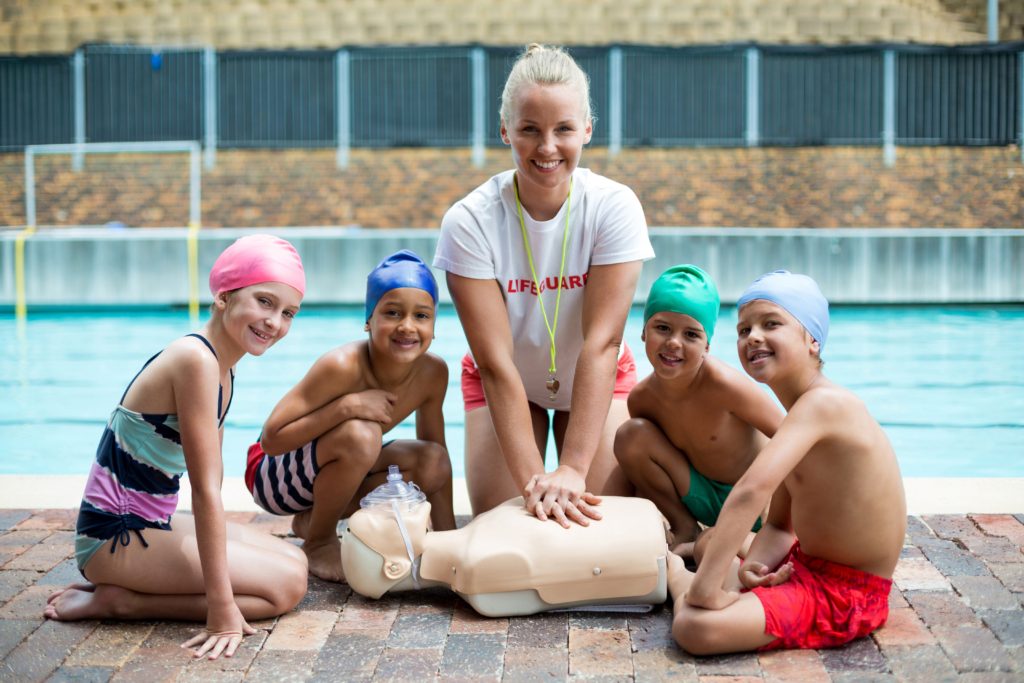POWERFUL TIPS ON POOL SAFETY
Although we have regular CPR classes in Fort Worth we hope you do not have to use your CPR training at the pool this summer. Warm weather is just around the corner, and one of the easiest ways to cool off is to take the kids swimming. Unfortunately, this fun-filled activity can also be hazardous if the proper precautions aren’t taken. In fact, among preventable injuries, drowning is the leading cause of death for children aged 1-4. To prevent these horrible accidents, you have to be prepared, so we have come up with the best ways to keep your family safe at the pool.
Supervision
The single most important action you can take to keep your children safe at the pool is supervision. All kids need direct, non-distracted, supervision at all times while in and around the pool. It also may seem obvious, but it’s important to make sure that the individual supervising the children is a confident swimmer in case they need to enter the pool and pool a child out safely. If you are having a pool party designate a lifeguard, someone who is a strong swimmer and is certified in CPR, or even hire a lifeguard for $10 or $15 per hour. Children can drown in a matter of 1-2 minutes so never leave a child unattended in a pool.
Swim Lessons
Lack of swimming ability is common among drowning victims. Teaching your children how to swim will not only make them more confident in the water but could also help them save themselves in the event of ending up in the pool accidentally. While all children develop at different rates, it’s a good idea to try and enroll them in swim lessons as soon as you feel they can do so successfully.
Follow the Rules
Establish and enforce rigid rules when it comes to the pool to make sure it’s safe for everyone. Rules at a public pool like “No Diving” and “No Running” are standard, so the same rules should apply no matter what swimming situation you find yourself in. Horseplay should not be tolerated.
Fence it in
If you have a pool at home, it’s important to take the proper safety measures to make sure that accidents don’t happen. Children are savvy, and if they want to go swimming, they will do everything they can to get to the pool to do so. To prevent children from entering the pool on their own, it’s essential to have a fence that surrounds the entire pool, equipped with a locking gate. If you want to double protect your at home pool, you can purchase a pool alarm that will sound if someone has entered the pool when they’re not supposed to.
Protect Your Skin
If you’re spending the day at an outdoor pool, it’s essential to protect against sunburns by applying and reapplying sunscreen at regular intervals.
Sign Up for a CPR Class in Fort Worth
Learn what to do in an emergency. We can try and prevent every scenario possible, but sometimes things are out of our control, so knowing how to handle a crisis can be the difference between life and death. One of the best ways to prepare yourself is to enroll yourself in a CPR and First Aid class. In the course, you’ll learn how to perform CPR along with other life-saving techniques. Having this knowledge under your belt can help you save a life in an emergency.
SCARY FACTS ABOUT DROWNING
1. As many as 25% of all drowning related deaths occur in water that is 3 feet deep or less, and 40% of drowning incidents occur within 6 feet of the side or the edge of the pool. (International Life Saving Federation)
2. Drowning is the leading cause of unintentional death for children ages 1-4. About 1 in 5 people who die from drowning are children 14 and younger.
3. More than 80% of drownings occur in residential pools or spas.
4. Any amount of water that covers the mouth and nose can cause drowning.
5. More than 50% of drowning victims treated in the emergency room require hospitalization or transfer for further care. These nonfatal drowning injuries can cause severe brain damage that may result in long-term disabilities such as memory problems, learning disabilities, and permanent loss of basic functioning such as being in a permanent vegetative state. (Center for Disease Control)
